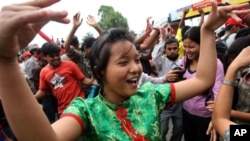Nepal on Monday faces a third consecutive day of disruption of civic life as a nationwide strike called by the Maoists continues. The former rebels have tens of thousands of members and supporters on the streets of the capital to enforce the crippling forced shutdown of commerce.
Talks among Nepal's three major parties resumed for 90 minutes Sunday evening in an attempt to break a deadlock in the deepening political crisis.
The latest round of the negotiations, which ended inconclusively, are being brokered by the Federation of Nepalese Chambers of Commerce and Industries. Its president, Kush Kumar Joshi, told VOA News he is optimistic of a breakthrough because dialogue is continuing. "And most probably they are also doing bilateral discussions by tomorrow with each party. And then afterwards, most probably, by tomorrow evening they'll come into the consensus for this," he said.
After Prime Minister Madhav Kumar Nepal refused to resign Saturday evening, the Maoists began enforcing a national strike.
Pushpa Kamal Dahal, better known as Prachanda, chairman of Nepal's Maoists, emerging from Sunday evening's negotiations confirmed the parties are still apart on some key issues and that is preventing a consensus. The Maoist leader warns that his followers may have to intensify their street activities in the days to come if an agreement is not quickly reached.
The Maoists, who won the 2008 election, pulled out of the government last year amid a power struggle involving leadership of the army and how to integrate the former guerrillas into the military.
Nearly 20,000 Maoist fighters, and their weapons, remain quarantined in camps under United Nations supervision.
Nepal faces a May 28th deadline to finalize what was agreed in the peace accord, including drafting a new constitution.
All parties acknowledge the remote chance of accomplishing that in the next few weeks.
Unless the major political parties agree to extend the deadline or call for new elections, Nepal would be plunged into an even more uncertain future with some analysts warning of the possibility of a return to civil war.
















